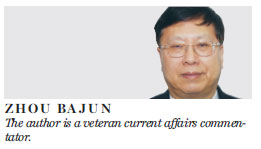Lee Kuan Yew's wisdom is timeless
Updated: 2015-04-01 07:56
By Zhou Bajun(HK Edition)
|
|||||||||
Zhou Bajun says the insightful comments by Singapore's founding father on Hong Kong are still relevant today to the SAR government and its people
T he passing of Singapore's founding father Lee Kuan Yew makes it pertinent to recall his many insightful and perceptive comments on Hong Kong over the years. These observations helped Hong Kong people assess the implementation of the "One Country, Two Systems" policy.
Lee courageously led the Lion City in its troubled relationship with Malaysia, first while united with its northern neighbor and then as founding father when it became a sovereign state in its own right following its ejection from Malaysia. As such, Lee was well aware of how to handle the internal British colonial legacy, and had great experience of dealing with a larger neighboring state.
Lee had enjoyed very close relations with Hong Kong since 1970s. Indeed, the University of Hong Kong awarded him an honorary doctorate in law in 1970. He was a regular visitor to Hong Kong's colonial governors. Lee also met late British prime minister Margaret Thatcher before her discussions on Hong Kong's future with Deng Xiaoping in the early 1980s.
The Singaporean leader's friendships with Chinese leaders dated back to his first visit to Beijing in 1976. For decades, Lee was a valued adviser to British and Chinese statesmen and a great inspiration to political leaders in Hong Kong and on the mainland.
Singapore and Hong Kong share many similarities. Both are small, densely populated cities; both have high-growth economies despite their limited natural resources. In Singapore there is a large Chinese population, while Hong Kong is almost entirely Chinese. Both have become important international financial centers. Lee had an extraordinary understanding of both places and their relationship with the Chinese mainland and Asia. Today, his insightful comments on Hong Kong are still pertinent to both the SAR government and its people.
Significantly, in an interview immediately prior to the 1997 handover, Lee said that Tung Chee-hwa, then Chief Executive (CE) elect, should scrap the last British governor Chris Patten's political reforms, in order to win the confidence of Beijing. Lee also once observed that Hong Kong's CE had "a thankless job". Hence his advice that whoever was elected CE should first earn the trust of the central government.
On Oct 25, 1999, in his speech "Hong Kong in the Transitional Period" Lee said he had never seen so many Hong Kong people so depressed about the challenges facing them after the handover. Lee advised the SAR to tackle three important issues. First, Hong Kong should be vigilant about populist movements arising from worsening partisan politics. He said Hong Kong should try hard to work out a new social contract between different groups in society. This would have the twin objectives of enlarging the "economic pie", and allowing it to be equitably distributed.
Second, Lee urged Hong Kong people to cultivate and cherish a new identity - that of being citizens of the HKSAR and of the People's Republic of China. He sincerely told Hong Kong people: "You are a part of China" and "You should understand it, otherwise, it would be difficult to reach a new social contract between the SAR government and the people in Hong Kong."
Third, Lee stressed Hong Kong should eliminate the negative effects of Patten's political reforms on the relationship between Hong Kong and the mainland. He advised Hong Kong to deepen its links with the mainland while preserving the city's unique characteristics. Lee believed that Hong Kong would only be able to properly contribute to China's national development through cooperation with the mainland in different social, economic and political spheres. Lee analyzed all these problems with care in order to understand the workings of the "One Country, Two Systems" policy. These three issues that Lee scrutinized so carefully 15 years ago, are still troubling people in the SAR today.
Since the Basic Law came into effect, the opposition has intentionally and consistently violated the "One Country, Two Systems" principle. Its aim appears to be to introduce Western democracy into Hong Kong, turning the HKSAR into an independent political entity; and then, to use Hong Kong as a Trojan horse to topple the central government. This is why since July 1, 2003, the opposition has organized a series of massive demonstrations ultimately targeting Beijing.
During a lunch with a local politician in 2005, Lee said, "Beijing has no intention of allowing Hong Kong to be a pacesetter or a Trojan horse." He added, "If you try to influence the course of events in China by example and say this is a better system, I would think that is not likely to win enthusiastic support."
Of course, some in Hong Kong have argued that their city is also different from Singapore. It is easier for Singapore, as a sovereign state, to get along with Beijing. Indeed, Hong Kong and Singapore in some ways have undertaken quite different economic, political and social paths. Lee created a Singaporean identity linked to traditional Chinese culture. Long before Hong Kong people began to seriously learn Putonghua, Lee made the language one of the official languages of Singapore. Chinese culture and history are an integral part of education in the Lion City. In sharp contrast, Chinese history has been made a non-compulsory subject in senior high school curriculums in Hong Kong. This demonstrates that Hong Kong still has much to learn from the example of Lee Kuan Yew, whose astute observations are still highly relevant to Hong Kong today.

(HK Edition 04/01/2015 page11)